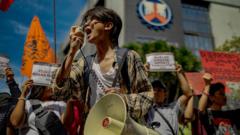Is Corruption and Nepotism to Blame for the Philippines' Flood Crisis?

Published: 2025-09-18 04:25:27 | Category: world
This article explores the ongoing frustration and anger of Filipinos, particularly public school teacher Crissa Tolentino, towards rampant corruption in flood control infrastructure and the government's failure to manage severe flooding exacerbated by an intense monsoon season. With accusations against lawmakers and contractors, this situation has sparked widespread outrage and calls for accountability across the nation.
Last updated: 21 September 2023 (BST)
Key Takeaways
- Severe flooding in the Philippines has intensified public anger over corruption in flood control projects.
- Public figures, including President Ferdinand "Bongbong" Marcos Jr, have acknowledged the corruption issue.
- Social media plays a significant role in galvanising public sentiment against corrupt politicians and contractors.
- Protests are planned, echoing historical movements against corruption in the Philippines.
- Filipinos are frustrated with the lack of infrastructure to combat flooding despite significant public funds allocated.
The Reality of Flooding in the Philippines
For many Filipinos, flooding has become an unfortunate part of life, particularly in low-lying areas like Apalit. Teachers like Crissa Tolentino navigate their daily routines by paddle boat, often feeling trapped in a cycle of inconvenience and despair. The current monsoon season has significantly worsened conditions, stranding millions and leading to outbreaks of diseases like leptospirosis, which is transmitted through contaminated water.
According to the 2023 data, nearly half of the Philippines' population experiences some level of annual flooding, with urban areas particularly hard hit. In recent weeks, the situation has escalated, prompting public outcry and questioning the efficacy of the government’s flood control measures.
Public Anger and Calls for Accountability
Crissa's frustration resonates with many as she expresses feelings of betrayal towards a government that collects taxes yet fails to deliver essential services. "I work hard, I don't spend too much and taxes are deducted from my salary every month," she remarked, highlighting the disconnect between taxpayers and government officials.
The anger is not just directed at flood management but also at the alleged corruption in how public funds are used. Reports suggest that the Philippine government has allocated substantial budgets for infrastructure projects, yet citizens are left wondering where the money has gone. President Marcos Jr himself admitted that corruption has siphoned off 70% of public funds meant for flood control, a staggering figure that has intensified calls for accountability.
Corruption Allegations and Political Fallout
Recent investigations have unveiled a network of corruption involving lawmakers and contractors. The House Speaker's resignation amid these allegations, despite his claims of innocence, indicates the gravity of the situation. Furthermore, the Senate's scrutiny of contractors like the Discaya family, known for their opulent lifestyle, has only stoked public outrage.
The backlash against the Discayas, who have been implicated in bribery and mismanagement of funds, has been significant. Visuals of their extravagant lifestyle have circulated online, juxtaposed with the suffering of ordinary Filipinos, fuelling anger across social media platforms.
The Role of Social Media in Mobilising Public Sentiment
Platforms like TikTok, Facebook, and X have become essential for Filipinos to voice their frustrations. Memes, videos, and songs, such as Gloc-9's "Upuan," have captured the public's sentiment, echoing their dissatisfaction with politicians. The hashtag "nepo babies" has also gained popularity, targeting the children of politicians who flaunt their wealth on social media.
Social media has allowed citizens to express their discontent creatively while fostering a sense of community among those demanding change. The collective Creators Against Corruption has emerged as a prominent voice, vowing to hold leaders accountable and promote transparency in governance.
Historical Context and Future Implications
The current situation echoes the Philippines' historical struggles with corruption, where public outrage has previously led to significant political changes. Notably, anti-corruption protests in the 1980s resulted in the ousting of then-President Ferdinand Marcos Sr, demonstrating the potential power of collective action.
As the nation prepares for an anti-corruption protest on 21 September, the anniversary of the declaration of martial law by Marcos Sr, there is a palpable tension in the air. President Marcos Jr has acknowledged the potential for public dissent, stating, "If I wasn't president, I might be out on the streets with them." This statement suggests an awareness of the gravity of the situation, but it remains to be seen whether it translates into meaningful action.
The Government's Response and Investigations
In response to the mounting pressure, President Marcos Jr has announced an inquiry into the alleged corrupt practices surrounding flood control projects. This investigation aims to "unmask the swindlers" and determine the extent of the financial losses incurred. However, scepticism remains among the populace regarding the effectiveness of these measures.
With 545 billion pesos (£7.1 billion) allocated for flood control and only a handful of firms receiving contracts, many are questioning the lack of transparency and competition in the bidding process. The central bank's decision to freeze assets linked to these contractors is a step towards accountability, but the public demands more than just financial repercussions.
Life Amidst the Chaos: Stories from the Ground
While the political landscape remains turbulent, everyday life for Filipinos continues to be affected by the ongoing flooding. Individuals like Rhens Rafael Galang have taken to creating innovative solutions to cope with the challenging conditions. His business selling overalls with integrated rain boots has gained traction on social media, showcasing an entrepreneurial spirit amid adversity.
Galang's experiences mirror those of many who navigate flooded streets daily, highlighting the resilience of the Filipino people. However, frustration over mismanagement and corruption lingers, as he expresses hope for a future where funds are used appropriately for disaster prevention and management.
Implications for the Future
The current crisis surrounding flooding and corruption in the Philippines raises significant questions about the future of governance in the country. As public sentiment grows increasingly vocal, the potential for reform or upheaval remains uncertain. Filipinos are demanding transparency and accountability from their leaders, and the outcome of the ongoing investigations will be closely monitored.
Moreover, the ability of the government to implement effective flood control measures will be crucial in restoring faith among the populace. With climate change continuing to exacerbate weather extremes, the need for proactive and honest governance has never been more pressing.
FAQs
What are the main causes of flooding in the Philippines?
Flooding in the Philippines is primarily caused by heavy monsoon rains, poor urban planning, deforestation, and inadequate infrastructure. Additionally, climate change has worsened the intensity and frequency of storms, leading to more severe flooding.
How has social media influenced public opinion in the Philippines regarding corruption?
Social media has allowed Filipinos to share their frustrations, organise protests, and mobilise against corruption. It serves as a platform for creative expression and collective action, amplifying voices that demand accountability from politicians and contractors.
What actions has the Philippine government taken in response to the flooding crisis?
The government has announced an inquiry into corruption related to flood control projects and has frozen the assets of implicated contractors. However, there is widespread scepticism about the effectiveness of these measures and whether they will lead to meaningful change.
What historical events are similar to the current anti-corruption sentiment in the Philippines?
The anti-corruption protests of the 1980s, which led to the ousting of President Ferdinand Marcos Sr, are a significant historical parallel. Public outrage over corruption has previously resulted in political upheaval in the Philippines.
How can individuals contribute to combating corruption in their communities?
Individuals can raise awareness about corruption, engage in community discussions, participate in protests, and advocate for transparency in governance. Supporting initiatives that promote accountability can also help drive change in local communities.
As the Philippines grapples with the challenges posed by flooding and corruption, the demand for integrity and accountability remains paramount. With the public's resilience and determination, the hope for a transparent and effective government persists. #PhilippinesFloods #Corruption #PublicAccountability



